| Listing 1 - 10 of 22 | << page >> |
Sort by
|
Book
ISBN: 2850760358 9782850760358 Year: 1977 Publisher: Paris: Dervy-livres,
Abstract | Keywords | Export | Availability | Bookmark
 Loading...
Loading...Choose an application
- Reference Manager
- EndNote
- RefWorks (Direct export to RefWorks)
Cabala --- History --- Joodse godsdienst. --- Cabala - History
Book
ISBN: 2841621367 9782841621361 Year: 2007 Publisher: Paris: Éditions de l'éclat,
Abstract | Keywords | Export | Availability | Bookmark
 Loading...
Loading...Choose an application
- Reference Manager
- EndNote
- RefWorks (Direct export to RefWorks)
La cabale se veut «réception» – c'est le sens littéral du mot – et transmission d'un sens mystique du texte biblique. Elle émerge en Provence au Moyen Âge et se réclame d'une tradition orale millénaire. Concentrée sur le Livre et sa “lettre”, elle prend le judaïsme à bras le corps et pénètre les cercles les plus divers de la pensée méditerranéenne, irradiant vers d'autres traditions qui reprendront et modifieront à leur tour ses formes et ses méthodes. Retracer alors le parcours des «réceptions de la cabale», depuis Pic de la Mirandole ou Johann Reuchlin, initiateurs de la cabale chrétienne, jusqu'à Rabbi Yehuda Halevi Ashlag et les cercles cabalistes de Jérusalem, en passant par les Lumières juives ou les cercles judéo-soufis de Lausanne, revient à redessiner la carte de la diffusion des idées européennes à l'aune d'une tradition paradoxale dont la divulgation, pourtant, n'épuise jamais le secret, comme a pu l'écrire Gershom Scholem, l'un de ses plus éminents spécialistes.
Cabala - History --- Mysticism - Judaism - Influence --- Cabala --- History. --- Mysticism
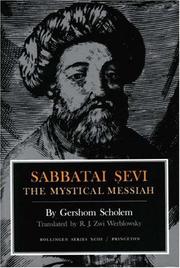
ISBN: 069101809X 0691099162 1400820421 Year: 1975 Volume: 93 Publisher: Princeton (N.J.) : Princeton university press,
Abstract | Keywords | Export | Availability | Bookmark
 Loading...
Loading...Choose an application
- Reference Manager
- EndNote
- RefWorks (Direct export to RefWorks)
One of the most important scholars of our century, Gershom Scholem (1897-1982) opened up a once esoteric world of Jewish mysticism, the Kabbalah, to concerned students of religion. The Kabbalah is a rich tradition of repeated attempts to achieve and portray direct experiences of God: its twelfth-and thirteenth-century beginnings in southern France and Spain are probed in Origins of the Kabbalah, a work crucial in Scholem's oeuvre. The book is a contribution not only to the history of Jewish medieval mysticism but also to the study of medieval mysticism in general and will be of interest to historians and psychologists, as well as to students of the history of religion.
Tsevi, Sabbataï --- Sabbatiens. --- Sabbataï Zevi, --- Sabbathaians. --- Shabbethai Tzevi, --- Sabbataï Zevi, --- Cabala -- History and criticism. --- Cabala -- History. --- Cabala. --- Sefer ha-bahir.
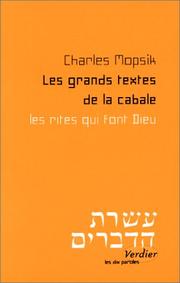
ISSN: 02430541 ISBN: 2864321610 9782864321613 Year: 1993 Volume: vol *9 Publisher: Lagrasse: Verdier,
Abstract | Keywords | Export | Availability | Bookmark
Book
ISBN: 2070700836 9782070700837 Year: 1984 Volume: 228 Publisher: [Lieu de publication inconnu]: Gallimard,
Abstract | Keywords | Export | Availability | Bookmark
 Loading...
Loading...Choose an application
- Reference Manager
- EndNote
- RefWorks (Direct export to RefWorks)
Gematria --- Cabala --- Gématrie --- Kabbale --- History --- Histoire --- Gématrie --- Cabala - History --- Jewish religion
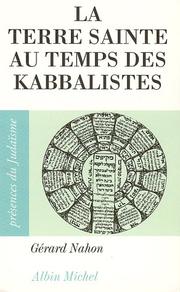
ISSN: 0755169X ISBN: 9782226095466 2226095462 Year: 1997 Volume: 22 Publisher: Paris: Albin Michel,
Abstract | Keywords | Export | Availability | Bookmark
 Loading...
Loading...Choose an application
- Reference Manager
- EndNote
- RefWorks (Direct export to RefWorks)
Cabala --- Kabbale --- History --- Histoire --- Jews --- Jews - Palestine - History - 16th century --- Cabala - History - 16th century
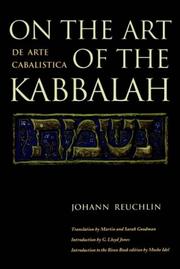
ISBN: 0803289464 Year: 1993 Publisher: Lincoln ; London Univ. of Nebraska Press,
Abstract | Keywords | Export | Availability | Bookmark
 Loading...
Loading...Choose an application
- Reference Manager
- EndNote
- RefWorks (Direct export to RefWorks)
Cabala --- History --- Early works to 1800 --- Cabala - History - Early works to 1800. --- Esoteric sciences --- Jewish religion
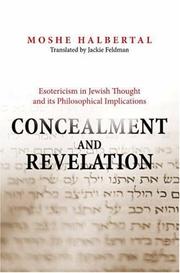
ISBN: 9780691125718 0691125716 9786612159183 1282159186 1400827965 9781400827961 9781282159181 Year: 2007 Publisher: Princeton, N. J. : Princeton University Press,
Abstract | Keywords | Export | Availability | Bookmark
 Loading...
Loading...Choose an application
- Reference Manager
- EndNote
- RefWorks (Direct export to RefWorks)
During the twelfth and thirteenth centuries, great new trends of Jewish thought emerged whose widely varied representatives--Kabbalists, philosophers, and astrologers--each claimed that their particular understanding revealed the actual secret of the Torah. They presented their own readings in a coded fashion that has come to be regarded by many as the very essence of esotericism. Concealment and Revelation takes us on a fascinating journey to the depths of the esoteric imagination. Carefully tracing the rise of esotericism and its function in medieval Jewish thought, Moshe Halbertal's richly detailed historical and cultural analysis gradually builds conceptual-philosophical force to culminate in a masterful phenomenological taxonomy of esotericism and its paradoxes. Among the questions addressed: What are the internal justifications that esoteric traditions provide for their own existence, especially in the Jewish world, in which the spread of knowledge was of great importance? How do esoteric teachings coexist with the revealed tradition, and what is the relationship between the various esoteric teachings that compete with that revealed tradition? Halbertal concludes that, through the medium of the concealed, Jewish thinkers integrated into the heart of the Jewish tradition diverse cultural influences such as Aristotelianism, Neoplatonism, and Hermeticisims. And the creation of an added concealed layer, unregulated and open-ended, became the source of the most daring and radical interpretations of the tradition.
Esoteric sciences --- Jewish religion --- Mysticism --- Cabala --- Judaism --- History. --- History --- Judaism. --- Mysticism - Judaism --- Cabala - History. --- Judaism - History - Medieval and early modern period, 425-1789
Book
ISBN: 2714410995 9782714410993 Year: 1977 Publisher: Paris: Belfond,
Abstract | Keywords | Export | Availability | Bookmark
 Loading...
Loading...Choose an application
- Reference Manager
- EndNote
- RefWorks (Direct export to RefWorks)
Jewish religion --- Cabala --- Cabala and Christianity --- History --- 296*41 --- Kabbala --- 296*41 Kabbala --- Christianity and Cabala --- Christianity and other religions --- Judaism --- Christian interpretations --- Relations --- Christianity --- Cabala - History

ISBN: 3110188929 9783110188929 3110925176 Year: 2006 Volume: 33 Publisher: Berlin: de Gruyter,
Abstract | Keywords | Export | Availability | Bookmark
 Loading...
Loading...Choose an application
- Reference Manager
- EndNote
- RefWorks (Direct export to RefWorks)
Leben und Werk des Frankfurter Philosophen und christlichen Kabbalisten F. J. Molitor (1779-1860) werden vor dem Hintergrund seiner Auseinandersetzung mit dem Judentum hier zum ersten Mal systematisch entfaltet.
Cabala --- History. --- 296*41 --- Kabbala --- 296*41 Kabbala --- Molitor, Franz Joseph, --- History --- kabbale --- Histoire --- Cabala - History. --- Molitor, Franz Joseph --- History of philosophy. --- Jews/religion. --- Kabbalah. --- Molitor, Franz.
| Listing 1 - 10 of 22 | << page >> |
Sort by
|

 Search
Search Feedback
Feedback About UniCat
About UniCat  Help
Help News
News